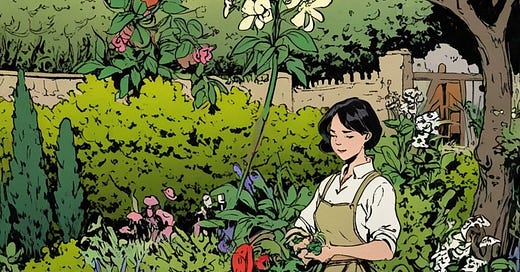Life, much like a garden, requires our attention and care. Just as weeds can choke the beauty of our blooms if left unchecked, unresolved issues can stifle our personal growth and relationships. Are you ready to roll up your sleeves and rethink what's growing in your garden? Let’s explore how to cut back the weeds and nurture the flowers in our lives!
In the journey of life, it can be all too easy to allow issues to linger. We often wish that problems would resolve themselves, akin to weeds vanishing from a garden. However, we know deep down that, similar to how those stubborn weeds can suffocate your beautiful flowers, unresolved challenges can hinder your personal development and relationships.
Pruning the Weeds
Consider this analogy: when you see grass encroaching on your garden’s plants, you don’t simply let it grow unchecked. You take the initiative to trim it back, as it can obstruct the flourishing of your cherished seeds. This principle extends to our lives as well. If you’re facing difficulties in your friendships or family dynamics, understand that these issues won’t simply disappear. We must confront them thoughtfully and maturely.
Having traversed the difficult paths of relationships myself, I can attest to the vital importance of addressing issues directly. In previous situations, I evaded challenging discussions, mistakenly thinking that silence would safeguard harmony. Instead, this avoidance only bred a silent gulf, allowing resentment to grow. It was only when I began to metaphorically prune these weeds by engaging in open, honest conversations that my relationships found new vitality.
The Power of Choice
We frequently undervalue the significance of choice. The notion of free will suggests that we are not confined to a preordained trajectory. We hold the power to decide our responses to challenges and conflicts. The wisdom found in Proverbs states,
“The prudent see danger and take refuge, but the simple keep going and pay the penalty” (Proverbs 22:3).
This highlights the necessity of a proactive stance.
Research conducted by the National Institute of Mental Health reveals that directly addressing emotional challenges can significantly reduce anxiety and enhance overall well-being. When we take the reins and confront our obstacles, we often uncover clarity and relief that had previously evaded us.
Lessons from the Garden
When I reflect on my experiences, I recall a time when my garden was overtaken with weeds. Feeling overwhelmed, I struggled to determine where to begin. This sensation often parallels our emotional states when confronted with numerous problems whether tied to work, personal life, or relationships.
The essential approach is to start with small steps.
Identify the Weeds: Take a moment to assess what’s troubling you. Is it a breakdown in communication with a loved one? An impending deadline at work? Recognizing the issues is the first crucial step.
Take Responsibility: Acknowledge your part in the situation. This doesn’t equate to assigning blame to yourself entirely, but rather understanding how your actions or inactions contribute to the challenge.
Initiate Conversations: It’s all too easy to let fear inhibit us, yet engaging in open dialogue is vital. According to a fact sheet by the American Psychological Association, 68% of conflicts can be resolved through direct communication.
Cultivate Patience: Remember, just as plants take time to thrive, so do solutions. Allow yourself and others the space to navigate these challenges with patience.
Personal Growth Through Challenges
Throughout my journey, I’ve discovered that confronting challenges often leads to surprising growth. For instance, after addressing a conflict with a close friend, not only did our relationship deepen, but I also uncovered essential insights about myself. I learned that vulnerability is indeed a strength.
Brené Brown profoundly states, “Vulnerability is not weakness. And that myth is profoundly dangerous.” Embracing vulnerability can help us forge deeper connections with others as well as within ourselves.
Welcoming Change for Growth
As we nurture our lives, it’s important to remember that change may feel daunting but is ultimately necessary. Facing our problems and embracing growth can lead to a more fulfilling life.
Final Reflections
In summary, don’t simply let things remain undone; take action to mend what is broken. By proactively addressing the weeds in your garden, you can create an environment where your seeds can thrive. The challenges you confront today may seem overwhelming, but always remember that you possess the power to transform your circumstances.
So, the next time you encounter a problem whether in your garden or in your life pause to consider. What weeds can you prune back? How can you nurture the growth of your seeds? Embrace this journey, and witness the emergence of a vibrant, thriving garden.
Until next time, let us cultivate growth together.
Warm regards
Khanya Mgwebi
Founder, BeKarnya and Co.
Question of the Week:
What "weeds" are currently affecting your personal growth or relationships, and what steps can you take to address them this week?
Incase You Missed It: Last Week Edition
Don’t Quit on Yourself—You Deserve to Keep Going
Hello and welcome to the latest edition of our BeKarnya and Co newsletter!







I love the garden analogy—so simple, yet powerful! It’s a great reminder that, like plants, our relationships and personal growth need constant care and attention. It’s interesting to think about the different ways to handle weeds—whether weeding, pruning, or deadheading—each method serves a purpose, and figuring out how to approach them is a task in itself, just like deciding how to address the challenges in our lives. Sometimes the hardest part is figuring out what kind of ‘weeding’ we need to do for ourselves. Thanks for this reminder to be mindful in our growth!
Lovely post Khanya. The Garden is such a wonderful metaphor for life, it needs care & maintenance. And as well as planting seeds for future reward, we do need to attend to those weeds which can soon take over.